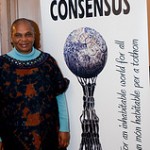Use your voice as a weapon of peace – Soledad O’Brien
Carse refers to “orchestrated anarchy” in his book Finite and Infinite Games.He describes not a leaderless group, but a group comprised of all leaders. Communication is clogged when persons are robbed of their voice. He explains”unheard silence is not the loss of the player’s voice, but the loss of listeners for that voice.” (p. 32).
People feel a part of the process when their opinions are solicited.Bosses need to abdicate the throne to behave as one with participants; to be an egalitarian peer, as opposed to an authoritarian taskmaster.Edicts and petitions should be reserved for constitutional monarchs, and not for those working in the imploded hierarchy of today’s office.
Everyone must be on par. If you are a “boss,” remove yourself from the role of maharaja by first ensuring a seating arrangement of equal closeness. Abdicate the throne of power to be one of your peers, an advocate for other people.
Brainstorming suggests that no idea is too ridiculous, and no idea can be criticized. Consensus implies (1) all ideas are considered; (2) those most impacted have an opportunity to make their case; and (3) the group has found a collaborative solution – one that results in a win-win for all parties, and in which no one feels manhandled.
Such an outcome requires behavioral finesse, the diplomacy described by Mary Kay Ash. A collaborator is one who makes others comfortable in their presence, and who encourages people to express opposing opinions. In other words, one who behaves in an equitable, egoless manner.
An unleader is a facilitator, a coach, and an expediter.One thing they are not is a loch master, or an “ideological bully intolerant of dissent.” Sharp, in his treatise “From Dictatorship to Democracy” argues “…unquestioning submission to authority figures and rulers has been long inculcated.” Egoless leaders substitute a bumbling, bull in the china closet approach to conflict management with organizational detente.
They provide correction with the gentility of an elder statesman (Fast, 1970) and guidance with the grace and social acumen of a seasoned diplomat.A manager who leads with “the wisdom of love” is one who directs others with compassion.Instead of bragging about himself, he is boastful about the achievement of others.He is the embodiment of love, where true love is sacrificial (Zohar & Marshall, 1990). Similarly, Zohar in The Quantum Self describes love as “…the opposite of narcissism, an attitude towards life that expresses commitment, involvement, sacrifice, and at the extreme, martyrdom… [it is] a wish to serve future generations inspired by a vision of the interconnectedness of existence.”
Your job as facilitator is to unearth the genius in others. People in community don’t feel like they had the wind knocked out of their sails; rather, they feel ready to sail full steam ahead. “To speak or act or think originally is to erase the boundary of the self. It is to leave behind the territorial personality. A genius does not have a mind full of thoughts, but is the thinker of thoughts, and is the center of a field of vision” (Carse, p. 68).
______________________________________________________________________________________________________________________________________________________________________________
References
Fast, J. (1970). Body language. New York, NY: Pocket Books.
Zohar, D., & Marshall, I. N. (1990, p. 155). The quantum self: Human nature and consciousness defined by the new physics (p. 145). New York, NY: William Morrow and Company, Inc.





Recent Comments